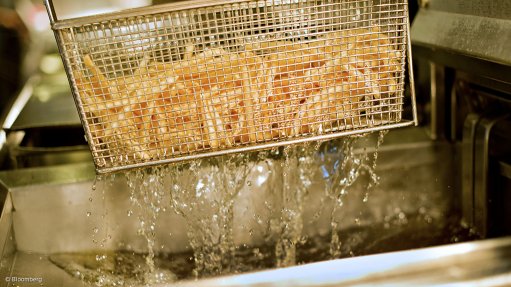
GREASY GOODNESS Biogreen Diesel uses a locally developed jet reactor, to convert waste oil into an environment-friendly fuel that can be blended with, or substituted for, diesel
Photo by: Bloomberg
Cape Town-based biofuel company Biogreen Diesel will start franchising its Biodiesel & Research model, to aid in the expansion of the industry and simultaneously increase awareness of biofuels in the region.
The company, having made the announcement in June on its website, says it felt it had grown sufficiently in the last nine years to support a “complete turnkey franchise [solution] like no other”.
Biogreen Diesel boasts that the solution is not only a great business opportunity, but will also assist in the mitigation of climate change.
The company uses a locally developed and patented jet reactor, invented by Org Nieuwoudt, to convert waste oil and chicken fat into an environment-friendly fuel that can be blended with, or substituted for, diesel. Its biodiesel product reportedly meets both European Union (EU) and US specifications.
It currently works with several high-profile companies and brands, including Woolworths Food, Pick n Pay, Steers and Burger King. Biogreen has noted that these companies strengthen their corporate image by using sustainable fuels in their operations, often resulting in favourable consumer reaction. Further, these Biogreen suppliers and customers are offered set contracts, independent of oil prices, to ensure reliable service and relatively stable prices.
As part of the June announcement, Biogreen Diesel MD Roy de Gouveia commented: “Legislation around commercial and noncommercial biodiesel production in South Africa has always been an issue. The parameters around volumes [are] the restraining factor of an industry that could create more jobs than most other sectors around the country.”
According to a 2015 press statement released by law firm Cliffe Dekker Hofmeyr, the regulations regarding the mandatory blending of biofuels with petrol and diesel came into effect in October 2015. Section 3 of the regulations states that all petrol and diesel supplied to a blending facility must allow for the blending of biofuels to the extent that the minimum concentration of the blended petroleum or diesel product contains 5% biodiesel by volume, or between 2% and 10% bioethanol by volume.
The regulations were based on the Department of Energy’s 2013/14 Final Biofuels Strategy, which provides for a 2% (or 400-million litres a year) penetration level of biofuels in the national liquid fuels supply. This percentage had been revised from the 4.5% blending target proposed in the 2006/7 draft strategy, the Biofuels Industrial Strategy.
The 2% allocation is a significantly smaller share of liquid fuels supply, compared with the EU, which, through its Biofuels Directive, introduced a blending target of 5.75% by 2010. The current target range for the 27 EU countries is set at between 5.75% and 7.5% by 2020.
Moreover, China has a target of 15% for 2020, while India’s 2009 biofuels law calls for a blending target of 20% by the end of this year.
Other countries, while their overall blending targets are unknown, allow for higher ethanol concentrations in their blended fuel products. These include Brazil (27%), Angola, Kenya, Nigeria, Mozambique, Jamaica, Panama, Fiji and the Philippines (all 10%), as well as Paraguay (25%).
Further, the targets, Argentina (10%), Brazil (7% to 10%), Indonesia (10%), Costa Rica (20%), Malaysia and Thailand (both 7%), allow for higher concentrations of biodiesel.
Apart from restrictive volumes, Biogreen Diesel previously noted that its biggest hurdle is the fact that government legislation requires companies that produce more than 25 000 ℓ to pay an array of taxes, including a contribution to the Road Accident Fund and the Fuel Levy.
Market research and consulting firm Frost & Sullivan – which awarded Biogreen Diesel the 2016 Company of the Year Award last year – profiled the company last year, noting that it produces between 20 000 ℓ/y and 25 000 ℓ/y.
The firm also noted that Biogreen Diesel’s newly established operations in Johannesburg and Durban would increase the company’s combined output to more than 30 000 ℓ/y.
In its profile, Frost & Sullivan highlighted that Biogreen Diesel is expected to improve its already strong growth, once its planned franchises become operational.
Changing to Biofuels
Biogreen Diesel has stated that biodiesel costs roughly R10.50/ℓ, which is lower than the current pump price of about R12.50/ℓ.
The company also acknowledges various motor vehicle manufacturers’ recommended blend in vehicles range from 5% to 100% for more industrial motors.
Consumers that want to change to biodiesel should note that vehicles that were manufactured after 1990 require no modifications prior to the switch.
Further, a ‘phasing-in’ period is not required for new vehicles; however, vehicles that have used petroleum-derived diesel are likely to have sludge and sediment
that will gradually be cleared away.